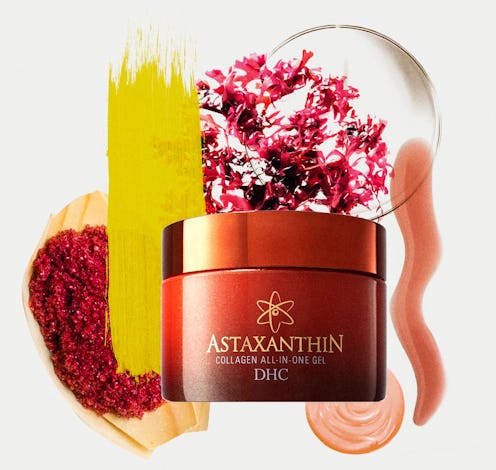(Back To Basics)
This Skin Care Ingredient Is 6000x More Powerful Than Vitamin C
On the forecast: brighter skin.

With new products, brands, and categories popping up every day, beauty can be a bit overwhelming. Back to Basics is our rudimentary beauty series that serves as your crash course on the science behind some of the best formulations in the game.
Aside from retinol, there is no other ingredient that’s quite as celebrated in the skin care world as vitamin C. It’s no wonder — the potent antioxidant is responsible for giving skin a brighter appearance, reducing dark spots and hyperpigmentation, and evening out your skin tone. But there’s a new ingredient in town that’s been proven to be 6,000 times more powerful than this heroic ingredient, and it’s called astaxanthin (say it with us, as-tax-an-thin).
According to Dr. Howard Sobel, board-certified dermatologist and founder of Sobel Skin RX, astaxanthin, though a lesser-known antioxidant, is loaded with skin and health benefits, with characteristics that fight free radical damage and “increase brain and eye function, lower blood pressure, and combat fatigue.” Health benefits aside, the antioxidant powerhouse is a surefire way for all skin types to achieve a healthier-looking complexion with regular use. To learn all about what astaxanthin can do for the skin, the industry’s leading skin care experts spoke to TZR all about this under-the-radar ingredient, below.
What Is Astaxanthin?
“Astaxanthin is a carotenoid that is found naturally in wild-caught salmon, lobster, shrimp, algae, and other sea life,” Dr. Sobel tells TZR. “Carotenoids deliver antioxidant protection while helping to reduce age-related degenerative diseases and skin conditions.” They’re also responsible for giving plants, algae, and fish their bright red, orange, or yellow color, which means your astaxanthin-containing products will likely have this hue, too. Not only is it said to be more effective than vitamin C, it’s also 500 times more powerful than vitamin E, making the antioxidant worthy of its superstar title.
The Benefits Of Astaxanthin
Astaxanthin’s all-star use in skin care is chocked up to the fact that it prevents oxidative stress, which can be caused by environment-induced free radicals. Our skin is constantly exposed to free radicals such as the sun, smoke, toxins, and pollutants, all of which can accelerate the aging process and can cause oxidative stress (which in turn leads to issues like discoloration, dullness, fine lines, and more).
With astaxanthin being more powerful than vitamin C, it’s more effective at neutralizing those skin-damaging free radicals and preventing oxidation. “Think of oxidation similar to how fruit oxidizes and rots when left out quicker than fruit that’s stored and protected in a refrigerator,” explains celebrity aesthetician Joshua Ross of SkinLab. The same rings true for the skin: When not shielded from the elements, damage can occur.
Naturally, this ability to neutralize free radical damage has anti-aging benefits, too. According to board-certified dermatologist and founder of Ava MD Dermatology Dr. Ava Shamban, astaxanthin improves the appearance of wrinkles and prevents new lines from forming. “Because astaxanthin protects against oxidation and UV damage, it functions to protect skin from the external factors causing its degradation,” she says.
Finally, astaxanthin has anti-inflammatory benefits, which is helpful for those with skin conditions such as psoriasis and eczema. “Inflammation can weaken the skin’s collagen protection as well as its barrier, which can ultimately lead to a loss in skin elasticity,” says Ross, who says that the ingredient can help combat elasticity issues as well as improve the health and function of the skin. Dr. Sobel adds that astaxanthin inhibits COX 2 enzymes (one cause of inflammation), which can in turn minimize inflammation, inflammaging, redness, and other skin conditions such as rosacea.
How To Use Astaxanthin
Astaxanthin can come from dietary sources (via foods such as salmon, shrimp, or crab), ingested as a supplement, or applied topically with skin care products. You’ll get the best results when using a combination of oral supplements and topical application daily, according to various studies. Topically, Dr. Shamban notes that all skin types can benefit from incorporating astaxanthin into their skin care routines, especially those with existing sun damage. Also, if you’re fair-skinned, Ross says it’s a particularly great choice (as this skin tone is more vulnerable to the negative effects of sun exposure) since the ingredient ensures ample antioxidant protection.
One caveat: Ross says that if you’re ingesting an astaxanthin supplement, make sure to speak to your doctor beforehand, as it can affect those with “bleeding disorders, diabetes, and autoimmune disorders.”
You’ll find astaxanthin in a variety of skin care products including serums and moisturizers. Generally speaking, it’s safe to use with other ingredients, but Dr. Sobel says it plays particularly well when used with products containing vitamin E omega-3 fatty acids. Of course, if you have sensitive skin, it’s always best to conduct a patch test to rule out any irritation.
We only include products that have been independently selected by TZR's editorial team. However, we may receive a portion of sales if you purchase a product through a link in this article.
Powered by astaxanthin, this tomato-red serum brightens skin, stimulates collagen, corrects sun damage, and protects against pollution and premature aging. Apply morning and night to kick stressed skin to the curb.
This brightening gel is just what the doctor ordered: Astaxanthin and vitamin E form a dynamic duo to fend off free radical damage while a hyaluronic acid derivative (sodium hyaluronate) maintains the skin’s moisture barrier. The result is smooth, hydrated, healthier skin.
Looking for both a physical and chemical exfoliation? This scrub from Glo Skin Beauty fits the bill, fusing jojoba esters and pumpkin enzymes with astaxanthin to increase cell renewal and tighten skin.
Looking for a night cream with an all-star list of ingredients that’ll work its magic while you catch some zzz’s? Look to this one from Derma E, which promises to renew, plump, and hydrate your skin with astaxanthin, vitamins A and E, and lavender oil.